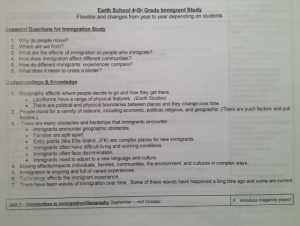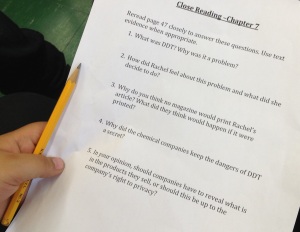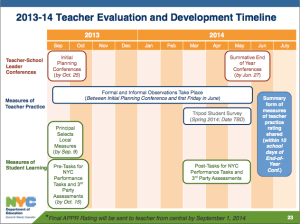New York City parents may be hearing that the New York State (NYS) Common Core math and ELA (English-language arts) tests will be better this year and are of value to educators and students.
This does not tell the whole story. Here’s the truth about the 2016 NYS tests.
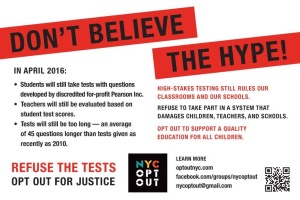
- Pearson created the 2016 tests. Questar Assessment Inc., which, in 2015, was awarded a $44 million, five-year contract by the New York State Education Department (NYSED), is in the process of developing test questions for future tests. However, their tests won’t be used until 2018. According to a January 2016 NYSED memo,”Questar Assessment, Inc. has replaced Pearson and is responsible for the construction of this year’s test forms and guidance materials.” Questar did not create the actual 2016 tests and test questions.
- While a total of 156 NYS educators may have reviewed the 2016 tests, NYS educators did not participate in the writing of the 2016 test questions. The actual development of the 2016 tests was done by Pearson. According to the New York State Education Department (NYSED), teachers will work with Questar to create field test questions in 2017. I would like to know how these 156 educators were selected – were any critics chosen?- and if their recommendations for change – if any – were taken seriously.
- The shortening of the 2016 NYS Common Core tests is insignificant. Students will still spend a total of six days taking the math and ELA tests (three days each). The tests are untimed this year so students could potentially sit for an even longer period of time to complete the assessments. The below comparison charts show how minimal the changes to the tests are. Also, shaving off a few questions does nothing to improve the quality of the test questions. The tests are still bad.
- Using NYSED’s online test archive, Kemala Karmen, a NYC parent and co-founder of NYCpublic.org, “calculated how many more test items a NYS student in 2016 will be required to answer than a NYS student in the same grade had to answer in 2010” (Karmen, 2016). In an email, Karmen wrote, “A 5th grader this April will be faced with 117 questions (combined math and ELA). 2010’s 5th grader? 61. That’s 56 more questions, or an increase of 92%.”
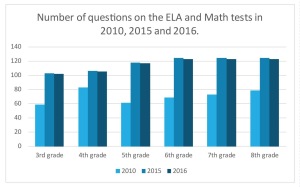
In addition to illustrating the sharp increase of test questions since 2010, this graph, created by NYC parent Amy Gropp Forbes, shows how insignificant the shortening of the 2016 is.
- The NYS Common Core ELA and math tests are not the only assessments administered this spring. NYSED recently released the 2016 field test assignments for NYS schools. Please click on this NYSED link to see if your school has been signed up to field test future math, science or ELA test questions. The June 2016 administration of the field tests is of no value to teachers or students, the latter of which are being used as guinea pigs.
- Similarly, many NYC parents are unaware of the excessive and developmentally inappropriate testing our English-language learners (ELLs) are subjected to. After only 12 months in the system, all ELLs in NYS must take the ELA test (ELLs are not exempt from the math test in their first year because translated versions of the assessment are available). During the recent parent-teacher conferences, it pained me to share with parents my goal for second graders who were at the expanding (advanced) English-proficiency level: to test proficient on this year’s NYSESLAT (New York State English as a Second Language Achievement Test). Administered each spring, the NYSESLAT is a grueling four-part test, now aligned to the Common Core, which assesses ELLs’ speaking, listening, reading and writing proficiency levels in English. It is a content-based assessment, not a true language test, and, in my professional opinion, it is wholly inappropriate to administer to ELLs at any grade level. Sentence writing, for example, is expected of ELLs in kindergarten. Spending my precious minutes discussing this highly flawed standardized test was bad enough, but my rationale for getting students to test out (test proficient or pass) tightened the knot in my stomach. If my expanding (advanced) ELLs do not pass the NYSESLAT this school year, in third grade they will have to take it again right after the widely discredited NYS Common Core ELA and math tests. I signed up to be a teacher, not a tester.
- I can’t think of a single working NYC teacher who finds the NYS Common Core tests to be a “valuable experience for our students” (as per New York City Department of Education (NYCDOE) chancellor Carmen Fariña’s 3/15/16 letter to parents). Pearson’s NYS Common Core tests are not teacher-created, nor do they accurately reflect the contextualized skills and knowledge that students gain in the classroom. The tests are developmentally inappropriate, poorly constructed and contain ambiguous questions. In 2014, 557 New York State principals signed this letter denouncing the tests. Despite the so-called changes to the 2016 tests, the content and the skills that are tested remain the same.
In painting a broader picture of the impact of NYS’s Common Core testing program on public education, it’s important to highlight that everything revolves around the highly flawed NYS Common Core tests. Despite the NYCDOE’s argument that multiple measures are used to determine a child’s promotion to the next grade, the testing program is the sun around which all other aspects of public education orbit. Schools with low test scores – due to poverty, high numbers of English-language learners and/or students with disabilities – are particularly vulnerable to scrutiny, micromanagement and excessive testing. These schools face state reviews and pressure to adopt Common Core test prep curricula (ReadyGEN, GO Math! and Expeditionary Learning, for example), all at the expense of offering students an authentic and inspiring education that truly meets their social, emotional and academic needs.
I have spent the past 10 years in Title I elementary schools in New York City. Our students go on fewer field trips, are exposed to a narrower range of books, and participate less in the arts. In Title I schools, beginning in kindergarten, there exists such a strong sense of urgency to prepare students for the skills they will need in order to do well on the state tests that not a moment is to be “wasted.” Cutting and pasting in first grade is wrongly viewed as lacking rigor. As a result, it’s not uncommon to find a second grader struggling to use glue and scissors. Folding paper, I’m discovering, is an undeveloped skill nowadays.
In schools with low test scores, there is no free play and, for the most part, recess only happens at lunchtime (weather permitting). Any classroom “play” must reinforce academic skills. School days can be suffocating for students and teachers alike. Curriculum pacing guides must be followed faithfully, which has killed spontaneity and deprives students of opportunities to learn about topics outside of the curriculum. I’ve even had to sneak in Martin Luther King, Jr. and Chinese New Year. My rich author study units highlighting the important works of Ezra Jack Keats and Leo Lionni, among others, are collecting dust. I mourn this loss of freedom every day I go to work. Forget about using students’ interests to shape instruction. “Choice” is only offered to students within the confines of the Common Core-aligned curricula.

Andy Yung, a talented pre-K teacher in Queens, presented this slide at last weekend’s Jackson Heights People for Public Schools event.
The organized opt-out movement here in NYC is led by local parents and educators who spend an inordinate amount of time researching the NYS Common Core testing program and educating themselves on developmentally appropriate pedagogy. Change the Stakes and NYC Opt Out, among others, report the truth through social media and through testing meetings that are being held all over NYC. While some NYC parents may have initially gravitated to this movement in order to protect their own children from educational malpractice, a growing number of opponents of the state testing program are opting-out for justice. Boycotting the tests and depriving the state of data is seen as the only way to effect change in our schools, and to curb the further privatization of public education (see what’s happening right now in the United Kingdom).

These parents and educators envision a different educational experience for all children of New York State. Bronx principal Jamaal Bowman speaks out against the current NYS Common Core testing program. As reported in this November 2015 Huffington Post article, “Jamaal Bowman knows his kids and with the research to back up his approach, he makes it clear that by empowering teachers and inspiring children toward their passions, in an atmosphere that embraces our diversity, we have the capacity to realize the goals that the current reforms are failing to produce.” I also appreciate Brooklyn New School principal Anna Allanbrook’s weekly letters to parents , which showcase her school’s whole child approach and contrast sharply with NYS’s test-based education reform initiatives. In Allanbrook’s March 7 letter, she links to a speech delivered by principal Bowman and writes, “Jamaal suggests that all parents exercise their right to opt out of high stakes testing, advising parents to demand more holistic assessment of their children. Jamaal’s words remind us of the words of Dr. Martin Luther King, Jr. who said, “Injustice anywhere is a threat to justice everywhere. We are caught in an inescapable network of mutuality, tied in a single garment of destiny. Whatever affects one directly, affects all indirectly.” These are brave, ethical NYC school leaders whom I greatly admire.
What about all the thoughtful and experienced NYC classroom teachers who find fault with these tests and don’t view them as a valuable teaching tool? The teachers of the MORE caucus of the UFT (United Federation of Teachers) support opt-out and oppose Common Core, Danielson teacher evaluations and high-stakes testing. MORE candidates, such as Jia Lee, who testified against high-stakes testing in a U.S. senate hearing last year, are running in this year’s UFT election. Teachers of Conscience refuse to administer both state and local standardized assessments. Teachers’ legitimate concerns, based on years of experience and knowledge of developmentally appropriate pedagogy, are absent from the official story that’s being told to NYC parents. In fact, NYC educators are being silenced and, as a result, are afraid to speak out. This is an attack on our democracy and goes against the so-called critical thinking that the NYCDOE purports to be promoting through Common Core.

This is just a glimpse of what’s really going on in NYC public schools. There is, of course, more to the story. Here is a link to view the March 2016 NYCDOE’s Student Participation in Grades 3-8 New York State Tests Parent Guide. Regardless of your child’s performance level, it is a parent’s right to opt out.
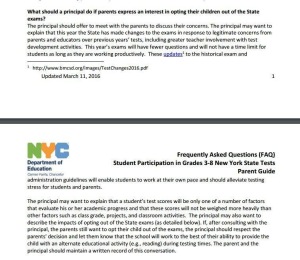
The NYCDOE 2016 guide states, “if, after consulting with the principal, the parents still want to opt their child out of the exams, the principal should respect the parents’ decision and let them know that the school will work to the best of their ability to provide the child with an alternate educational activity (e.g., reading) during testing times.”
For more information about opting out, please visit these sites:
Ten Reasons Why NO Child Should Take the NYS Common Core Tests
NYS Allies for Public Education
Defending the Early Years – deyproject.org



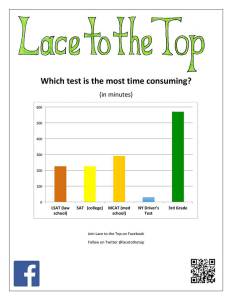 2.) They are developmentally inappropriate.
2.) They are developmentally inappropriate. 

